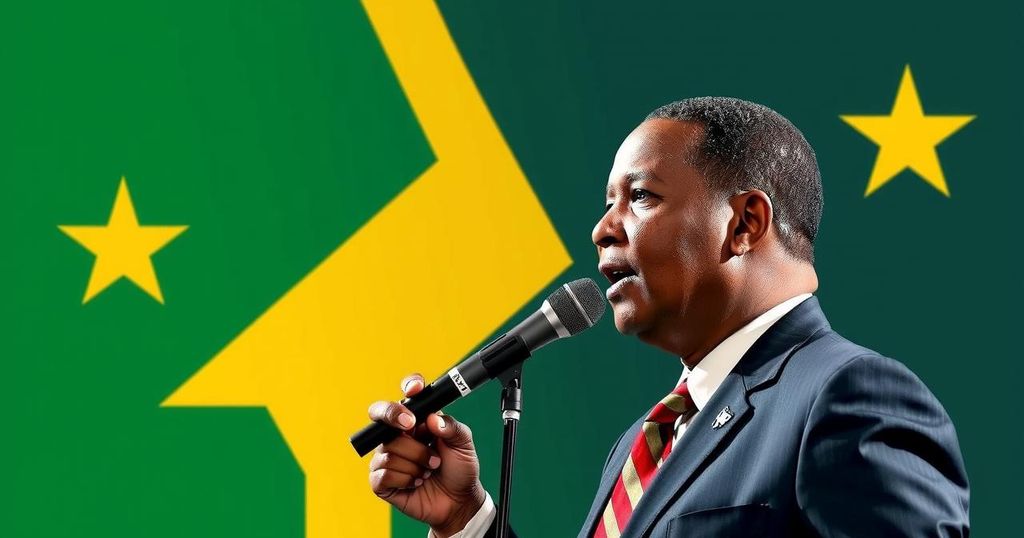Concerns Emerge Over Zanu PF’s Interference in Regional Elections
Job Sikhala, a prominent opposition figure in Zimbabwe, has condemned Zanu PF’s meddling in the elections of neighboring nations, particularly accusing the party of electoral interference in Botswana and Mozambique. His warnings highlight the potential backlash against Zimbabweans abroad as a result of Zanu PF’s actions, which he labeled as a “rigging cancer” affecting regional politics. Sikhala also suggests Zanu PF’s ambitions extend to upcoming elections in Zambia, raising further concerns about the party’s influence and intentions in the Southern African region.
Job Sikhala, the former legislator for Zengeza West and St Mary’s, has issued a grave warning to the Zimbabwe African National Union-Patriotic Front (Zanu PF) regarding its interference in the electoral processes of neighboring nations, which he claims endanger Zimbabweans abroad. Sikhala, who serves as the chairman of the National Democratic Working Group (NDWG), expressed his concerns following a recent rally in Botswana where former President Ian Khama accused Zanu PF of deploying agents to manipulate the upcoming elections set for October 30, 2024. The current Botswana President, Mokgweetsi Masisi, is seeking reelection. Sikhala further accused the ruling party of having a hand in the recent elections in Mozambique and previously in South Africa’s polls earlier this year. He articulated the increasing resentment that such actions might provoke against Zimbabwean citizens in the region, stating, “As Zimbabweans, we are being risked being hated everywhere in the region because of a stinking party that loves to interfere in the domestic affairs of other countries.” He condemned Zanu PF for hypocrisy, as they vocally denounce outside interference in their governance yet engage in such meddling elsewhere. He labeled the party’s activities as a “rigging cancer” spreading across the region, potentially jeopardizing the welfare of Zimbabweans residing abroad. Additionally, Sikhala referenced a concerning incident during Mozambique’s elections where Zanu PF supporters allegedly participated in voting, raising doubts about the credibility of the electoral outcome favoring the ruling Frelimo party. The close ties between Frelimo and Zanu PF, dating back to Mozambique’s liberation struggle, further complicate this issue. As a further testament to Zanu PF’s regional ambitions, Sikhala suggested the party is currently attempting to meddle in the electoral processes of Botswana and Zambia. In Zambia, he noted attempts to bring back the controversial former president Edgar Lungu, a notable ally of Zanu PF, creating tensions with the current leadership that criticizes his record. Overall, Sikhala’s remarks highlight serious concerns regarding electoral integrity in the Southern African region as well as the potential diplomatic repercussions of Zanu PF’s interventions.
The Southern African region has been characterized by political volatility and concerns over electoral integrity, particularly with the actions of ruling parties like Zanu PF in Zimbabwe. As Zanu PF continues to assert itself within the Southern African Development Community (SADC), allegations of electoral manipulation and interference in the domestic politics of neighboring countries have emerged. Job Sikhala, an opposition figure, has become a vocal critic of these behaviors, claiming such actions could incite animosity towards Zimbabweans living abroad and compromise regional security and peace.
In conclusion, Job Sikhala’s statements reflect a growing alarm over Zanu PF’s alleged attempts to interfere in the electoral processes within the region, which he views as detrimental to the reputation and safety of Zimbabweans in the diaspora. His accusations against the party highlight broader concerns regarding electoral integrity and regional stability in Southern Africa, particularly as Zanu PF seeks to exert influence in countries like Botswana and Mozambique while evoking historical ties from liberation struggles. The implications of these actions pose a significant risk to diplomatic relations and regional harmony.
Original Source: www.newzimbabwe.com




Post Comment